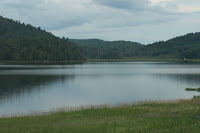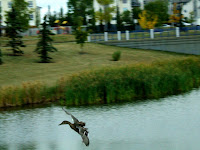When I came upon the top of the rise above the pond, the first thing that I noticed was men hard at work trimming grass from around the trees which is a harmless activity, except of course for the noise. The second thing I noticed was the men wearing white protective gear, who were in the process of spraying chemicals around the entire pond; an activity which is not without consequence or harm.
 I watched these men in white saturating the ground with toxins (most likely a pesticide or herbicide) very close to the water's edge, shaking my head with disgust. My disgust was centered around several things. First of all neither of the two men spraying the chemicals were wearing masks, despite their white protective suits, and second I had not heard from any source that they would be spraying the park. In fact there were no notices posted anywhere of the intention to do so. The fact that the spraying was taking place so early in the morning hints that it was deemed unnecessary to do so. This also indicates to me that the city, perhaps assuming that no one would be at the park at such an early hour, decided no one would be in danger of exposure.
I watched these men in white saturating the ground with toxins (most likely a pesticide or herbicide) very close to the water's edge, shaking my head with disgust. My disgust was centered around several things. First of all neither of the two men spraying the chemicals were wearing masks, despite their white protective suits, and second I had not heard from any source that they would be spraying the park. In fact there were no notices posted anywhere of the intention to do so. The fact that the spraying was taking place so early in the morning hints that it was deemed unnecessary to do so. This also indicates to me that the city, perhaps assuming that no one would be at the park at such an early hour, decided no one would be in danger of exposure. If this is the case the city is wrong. Not only was I at the park and have a habit of frequenting it regularly early in the morning, I am not the only person to do so. In fact many people do, including kids heading off to school. More importantly the park is never empty of life, it is in fact populated by a variety of water fowl, song birds, shore birds, and other wildlife.
So here is where we come to the main reason for my disgust, which is that I doubt very much that the wildlife is ever considered by the city when it comes to the spraying of chemicals to ensure the comfort of this city's human population. People do not want to be bothered by mosquitoes, nor do they want undesirable plants growing and going to seed to be carried by the wind to their gardens, and then of course there is the need for a perfect lawn to run and play on.
Be that as it may, the fact remains that the wildlife that lives on, or visits frequently, mates and feeds at this pond is exposed to these chemicals. I have noted that this year in particular has brought a larger variety of birds to this specific pond and I was delighted to see it so. Now however, I kind of wish that this wasn't the case, because I know of course that they will come to harm in some manner from the chemicals being sprayed. Some of them may even die.
Notice how close to the water's edge the chemicals are being sprayed. These chemicals seep into the ground and water where the water fowl spend most of their time, and also coat the bushes, shrubs and other plants that grow next to the pond. These same plants provide sustenance, or shelter for some, if not all the wildlife at this park and it's pond. In the picture below you can see some of them grazing on the edge of the pond.
Some of the waterfowl feed both in the water and on the shore. The American Coot is a perfect example to prove this fact, however, others feed exclusively in the water, below the surface. These are the Horned Grebe who have decided to grace the pond with their presence this year, as well as the Lesser Scaub and the Ruddy Duck. Rabbits also regularly feed here on the grass and bushes. I have seen Kingfishers, Merlins, Prairie Hawks and Herons frequent this pond, not to mention Tree Swallows and other wildlife. Some of these only stay for a few days and some make their summer home here.
What makes it worse for all these animals, is that the majority of the chemicals which have seeped into the ground on the land surrounding the pond will also eventually end up in the water after the next rainfall. Water runs downhill after all, and the pond sits smack in the middle of the little valley that makes up this park. Worse still, because it is a pond, the water does not circulate so that the chemical concentration can be lowered and the risk decreased. Instead rainfall increases the levels of exposure dangerously for the wildlife that is present, and serves to make their exposure to these chemical toxins constant.
Who knows precisely how the chemicals being sprayed at this park will affect these birds in the end, I certainly don't, however I do know that the smaller the body taking in the toxin, the more harmful the effects will be on that body and the longer the exposure the worse it gets. Aside from the fact that I have no wish to be exposed to a fresh dose of these chemicals, as I'm sure other people don't, I have the choice not to be, at least in this area and at this time. Therefore I was only exposed to them for a brief period, the wildlife present at the park will be exposed to it constantly throughout the day, or until it dissipates, at least from the air.
However, they will ingest it through the plants which absorb it, through the water, as well as eventually by the crustaceans and fish that live in the water who ingest it. It will coat their feathers and feet, and their nostrils as they breathe it it. I find myself wondering now, having thought all this through, how often the park is sprayed, what the toxicity level is in this pond and how it will affect the newly hatched young of the wildlife living there this summer. How will it affect those that are still in the egg unhatched? This is the time of year when eggs are laid after all.
I have already noticed that this year there are fewer waterfowl babies on the pond. In fact, of the half dozen or more newly hatched ducklings that I saw on the pond just last week, only one survives today. This might just be a coincidence; however, it is not at all typical of what I usually observe at this pond. In previous years there have been at least two or three females with six or more ducklings. Many of these surviving to the migratory season. Last year there was even a brood of American Coot.
As humans we know of the danger of chemical toxins. The wildlife does not, they are innocent of any wrong doing, unless you consider living and breathing wrong, and yet they are punished and suffer physically from our actions. They do not know of the danger and so do not have the choice to fly off to safety, nor to protect their young by raising their family elsewhere. But no one seems to care. While it is true that most people who frequent the park admire, and even take delight in observing the wildlife, sadly once they leave the park the wildlife is forgotten.
Yet, we really should care and pay close attention to the health of this wildlife because, when all is said and done, what affects the wildlife also affects us. The chemicals that are being sprayed about so carelessly have been proven to be very harmful to humans, especially children. Parents often bring their children for a picnic to the park, they in turn then romp around in the grass, collecting the chemicals on their hands, clothing, footwear and in their nostrils, if not their mouths. Some of these children even splash around in the water on the edge of the pond.
While children are unlikely to eat the plants or drink the water at this pond, this fact still brings up the most interesting questions such as, are their parents aware of the danger? Would they choose to take their children elsewhere if they knew? Would they allow the spraying to continue, or would they try to prevent it so their children would be safe from harm? There are other ways to keep down the weeds and protect us from mosquito populations after all, which work perfectly well.
Many people however live with the mistaken belief that the toxins being sprayed evaporate and dissipate within and few hours, after which they can cause no more harm and so they are not concerned. The truth is once the toxins are spread throughout an area, they do not magically disappear, they are moved around in the environment by nature until they end up pooling somewhere in concentrated amounts. Once this happens chances are slim that they won't end up in the nearest body, whether it be human or animal.
Unfortunately, it is the wildlife that is affected first and suffers the most, and should serve as a warning much in the same way that Canaries did when they were taken into coal mines to serve as warning signs for the miners to indicate when dangerous gases were present. Therefore someone should be monitoring the levels of toxins in the pond, as well as the number of newly hatched birds and investigating any decline in those numbers. The point is, that in taking care to ensure that the wildlife we share our environment with stays healthy we also ensure our own health.
Susan
Update: two days after I posted this article I discovered two things: 1) signs were posted at the park that it had been sprayed after the men were done spraying the toxins 2) The only baby duckling left on the pond at the time that it was sprayed is gone. I couldn't spot it or it's mother even though I circled the pond several times and stayed for quite some time

 Merlin in flight
Merlin in flight








